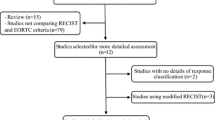Abstract
The features and advantages of Chinese medicine (CM) in cancer comprehensive treatment have been in the spotlight of experts both at home and abroad. However, how to evaluate the effect of CM more objectively, scientifically and systematically is still the key problem of clinical trial, and also a limitation to the development and internationalization of CM oncology. The change of tumor response evaluation system in conventional medicine is gradually consistent with the features of CM clinical effect, such as they both focus on a combination of soft endpoints (i.e. quality of life, clinical benefit, etc.) and hard endpoints (i.e. tumor remission rate, time to progress, etc.). Although experts have proposed protocols of CM tumor response evaluation criteria and come to an agreement in general, divergences still exist in the importance, quantification and CM feature of the potential endpoints. Thus, establishing a CM characteristic and wildly accepted tumor response evaluation system is the key to promote internationalization of CM oncology, and also provides a more convenient and scientific platform for CM international cooperation and communication.
Similar content being viewed by others
Refenences
Cheng ZX, Wang KM. Research progress of tumor response evaluation. Bull Chin Cancer (Chin) 2009;8:548–553.
Li J, Lin HS. Integrative medicine: a characteristic China model for cancer treatment. Chin J Integr Med 2011;17:243–245.
Li J, Lin HS, Hou W, Zhang PT, Hua BJ. Development and current status of national cancer center for Chinese medicine. Chin J Integr Med 2011;17:478–480.
Schipper H, Clinch J, McMurray A, Levitl M. Measuring the quality of life of cancer patients: the Functional Living Index-Cancer: development and validation. J Clin Oncol 1984;2:472–483.
Burris HA, Moore MJ, Andersen J, Green MR, Rothenberg ML, Modiano MR, et al. Improvements in survival and clinical benefit with gemcitabine as first-line therapy for patients with advanced pancreas cancer: a randomized trial. J Clin Oncol 1997;15:2403–2413.
Zou X, Liu BR, Qian XP. Probe into traditional Chinese medicine tumor response evaluation critera. J Nanjing Univ Tradit Chin Med (Chin) 2005;21:270–272.
Zhang J, Wang P. Research of quality of life and traditional Chinese medicine efficacy evaluation in malignant tumor. J Beijing Univ Chin Med (Chin) 2000;23:67–69.
Li J, Lin HS, Hou W. The concept and strategy of traditional Chinese medicine in cancer treatment. Chin Oncol (Chin) 2010;19:735–738.
Zhang JJ, Meng Q, Chang W. Clinical assessment of the efficacy of anti-cancer treatment: current status and perspective. Chin J Cancer 2010;29:250–254.
Therasse P, Arbuck SG, Eisenhauer EA, Wanders J, Kaplan RS, Rubinstein L, et al. New guidelines to evaluate the response to treatment in solid tumors. European Organization for Research and Treatment of Cancer, National Cancer Institute of the United States, National Cancer Institute of Canada. J Natl Cancer Inst 2000;92:205–216.
Xue NZ, Lin LZ. Application of traditional Chinese medicine tumor response evaluation riteria in advanced NSCLC. J Guangzhou Univ Tradit Chin Med (Chin) 2009;26:108–112.
Lin HS, Li SQ. Efficacy evaluation methods of traditional Chinese medicine in advanced lung cancer. Bull Chin Cancer (Chin) 2000;9:354–355.
Zhou DY, Lin LZ, Tao ZG. Application of traditional Chinese medicine tumor response evaluation system in advanced NSCLC. Bull Chin Cancer (Chin) 2005;14:654–657.
Zhang PT, Yu MW, Yang ZY. Comparative study on the methods of chinese medicine and western medicine therapeutic evaluation for advanced non-small cell lung cancer. Chin J Integr Tradit West Med (Chin) 2010;30:702–705.
Li CH, Hua BJ, Lin HS. Current status and problems of traditional Chinese medicine efficacy evaluation in treating malignant tumor. Beijing J Tradit Chin Med (Chin) 2010;29:187–190.
Shi ZM, Tian JH. Correlative factors for cancer response evaluation treated by traditional Chinese medicine. Shanghai J Tradit Chin Med (Chin) 2006;40:16–18.
Que HF, Chen H, Xu JN. Discussion of relationship between quality of life and clinical effect assessment of malignant tumor treated with traditional Chinese medicine. J Chin Integr Med (Chin) 2005;3:253–256.
Li Z, Chen XY, Liu D. Clinical thinking of traditional Chinese medicine comprehensive treatment in lung cancer. Chin J Basic Med Tradit Chin Med (Chin) 2005;11:149–150.
Zhang PT. Probe into criteria of Chinese medicine clinical efficacy. Bull Chin Cancer (Chin) 1999;8:453–454.
Lin HS, Zhang Y. On the tumor therapeutic effect assessment in traditional Chinese medicine. World Sci Tech (Moder Tradit Chin Med Mater Med, Chin) 2009;11:739–741.
Lu CJ. Problems and strategies of establishing traditional Chinese medicine clinical efficacy evaluation system. J Chin Integr Med (Chin) 2011;31:446–448.
Lai SL. Evaluation of clinical efficacy of Chinese medicine. Chin J Inf Tradit Chin Med (Chin) 2000;7:88–89.
Nie H, Wang Q. Traditional Chinese medicine syndrome effect evaluation based on the correlativity of outcome indicators. J Tradit Chin Med (Chin) 2011;52:111–113.
Yang YF, Zhu RW, Wu Y. Initiate probe and application of criteria in traditional Chinese medicine comprehensive efficacy of malignant tumor. J Chin Integr Med (Chin) 1999;19:340–343.
Su W, Xu ZY. Current research status of tongue diagnosis in cancer patients. Zhejiang J Tradit Chin Med (Chin) 2009;44:915–917.
Liu R, Zhang YR, Dong Y. The characteristic and prognosis of senior cancer patients in Chinese medicine hospital. Bull Chin Cancer (Chin) 2011;20:584–587.
Lin HS. Use evidence base medicine to promote the development of traditional Chinese medicine oncology. J Chin Integr Med (Chin) 2003;23:614–615.
Lu AP, Zhao J, Jiang M. The key problems affecting traditional Chinese medicine efficacy evaluation are syndrome classification and comprehensive intervening measure. J Chin Integr Med (Chin) 2011;31:449–451.
Author information
Authors and Affiliations
Corresponding author
Rights and permissions
About this article
Cite this article
Li, J., Li, L., Liu, R. et al. Establishing Chinese medicine characteristic tumor response evaluation system is the key to promote internationalization of Chinese medicine oncology. Chin. J. Integr. Med. 18, 730–736 (2012). https://doi.org/10.1007/s11655-012-1254-0
Received:
Published:
Issue Date:
DOI: https://doi.org/10.1007/s11655-012-1254-0




